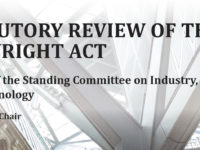Copyright law and policy was an important part of season one of the Law Bytes podcast with several episodes devoted to Canadian reforms as well as international developments. The Canadian copyright review figured prominently: Episode 4 featured clips from my appearance before the Standing Committee on Industry, Science and Technology including exchanges with MPs, a later episode contained my lecture on what the Canadian experience teaches about the future of copyright reform, and Carys Craig came on the podcast to discuss the Industry committee copyright review report.
Post Tagged with: "craig"
The LawBytes Podcast, Episode 16: The Copyright Review Report – Carys Craig on the Roadmap for the Future of Canadian Copyright Law
In December 2017, the Canadian government launched its much-anticipated and much-lobbied review of Canadian copyright law, tasking the Standing Committee on Industry, Science and Technology to lead the way. After months of study and hundreds of witnesses and briefs, the committee released its authoritative report with 36 recommendations earlier this month. Carys Craig, a law professor at Osgoode Hall Law School and one of Canada’s leading copyright law experts, joins the podcast to help sort through the report and to consider what it means for the future of Canadian copyright law.
The Copyright Pentalogy: Technological Neutrality
Last month, the University of Ottawa Press published The Copyright Pentalogy: How the Supreme Court of Canada Shook the Foundations of Canadian Copyright Law, an effort by many of Canada’s leading copyright scholars to begin the process of examining the long-term implications of the copyright pentalogy. As I’ve noted in previous posts, the book is available for purchase and is also available as a free download under a Creative Commons licence. The book can be downloaded in its entirety or each of the 14 chapters can be downloaded individually.
The book includes two articles on technological neutrality, whose inclusion as a foundational principle of Canadian copyright was a landmark aspect of the copyright pentalogy. The message from the Court is clear: copyright law should not stand in the way of technological progress and potentially impede the opportunities for greater access afforded by the Internet through the imposition of additional fees or restrictive rules that create extra user costs. Viewed in this light, technological neutrality as a principle within Canadian copyright may have the same dramatic effects on the law as the articulation of users’ rights did in 2004.
Beyond Users’ Rights: Supreme Court Entrenches Technological Neutrality as a New Copyright Principle
The technological neutrality principle is discussed in several cases, but gets its most important airing in the Entertainment Software Association of Canada v. SOCAN decision. The majority of the court states:
Locking Out Lawful Users
Educational, parodic and other transformative uses have long been recognized as potential fair uses in the United States. Indeed, the need to expressly include these specific exceptions in Canada speaks more to the shortcomings of the Canadian approach to fair dealing (in contrast to US fair use) than it does to the pursuit of a genuine balance between owners and users in the copyright reform process.
Craig reserves her harshest criticism for C-32’s digital lock provisions, which she describes as “unduly expansive,” concluding:








